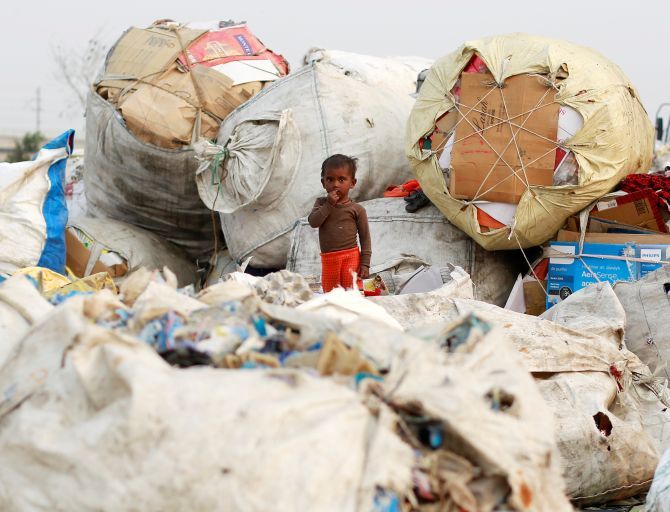 | « Back to article | Print this article |
The Delhi government will identify single-use plastic littering hotspots and the entry points of such items into water bodies and drains by October 31 this year, according to a draft action plan for the elimination of the environmentally hazardous products.

In accordance with the Union Environment Ministry's notification, all single-use plastic items and manufacturing facilities in the capital will be closed down by June 30, 2022.
Urban local bodies and the environment and urban development departments will provide incentives for penetration of alternatives in the market and form a scheme for promotion of recycling technologies and recycled products.
The Union Environment Ministry's April 12 notification said the manufacture, import, stocking, distribution, sale and use of identified single-use plastic commodities, including polystyrene and expanded polystyrene, will be prohibited with effect from July 1, 2022.
The identified SUP items include earbuds, plastic sticks for balloons, flags, candy sticks, ice-cream sticks, polystyrene (thermocol) for decoration, plates, cups, glasses, cutlery, wrapping or packaging films around sweet boxes, invitation cards, cigarette packets, plastic or PVC banners less than 100 micron, and stirrers.
Officials said the environment department received several valuable inputs from various stakeholders towards identification and adoption of feasible alternatives to identified SUP items. These have been factored in while drafting the comprehensive action plan.
According to the Delhi government's draft plan for elimination of SUP, urban local bodies (ULBs) will identify littering hotspots and develop a strategy for their collection and management by October 31.
The ULBs and the tourism and archeology departments will develop a strategy for targeted campaigns at littering hotspots such as tourist spots, places of religious and cultural importance, weekly markets, and urban sprawls.
The ULBs, Delhi Jal Board and Irrigation and Flood Control Department will also identify "ingress points of littered SUP items in surface water bodies and drains" and devise a prevention strategy by October-end.
A phase-wise plan will be prepared for cleaning water bodies and drains of floating SUP items and their management.
The plan also requires ULBs to document the quantity of plastic waste at legacy waste sites such as Bhalswa, Ghazipur and Okhla landfill sites, and manage it.
A state-level task force has already been formed for elimination of SUP and effective implementation of Plastic Waste Management Amended Rules, 2021.
At the first meeting of the STF, it was decided that a plastic waste monitoring dashboard and ULB-wise task forces will be created.
By September 30, the government will identify a nodal department for coordinating the implementation of plastic waste management rules.
The Delhi Pollution Control Committee and the urban development department will develop a database of producers, importers, brand owners, recyclers and plastic waste processors implementing the Extended Producer Responsibility (EPR) by December 31.
Extended producer responsibility is a policy approach in which producers take responsibility for management of the disposal of products they produce once those products are designated as no longer useful by consumers.
The assessment of district-wise plastic waste generation in the capital and the infrastructure required for its management -- collection, segregation and recycling -- will be completed by March 31 next year, according to the draft plan.
The government will also come up with an incentive scheme for the "setting up of plastic recycling capacity" and a scheme for promotion of recycling technologies and products made from recycled plastic by January.
The draft plan said that industrial composting facilities for compostable plastic will be developed by June 30, 2022.
Delhi generates 1,060 tonnes of plastic waste per day. Single-use plastic is estimated to be 5.6 per cent (or 56 kg per metric tonnes) of the total solid waste in the capital.